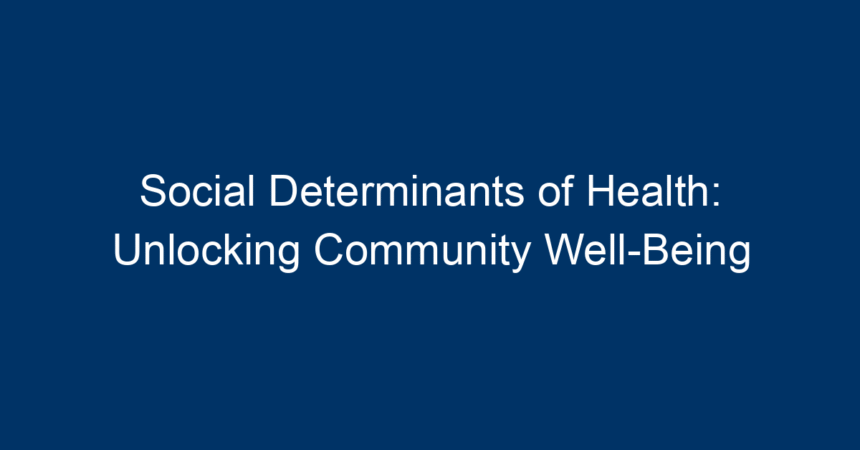In recent years, the discussion surrounding health has expanded far beyond the medical and clinical realms. Increasingly, we are recognizing that a multitude of factors—collectively referred to as social determinants of health—play a crucial role in determining the health outcomes of individuals and communities. Understanding these determinants is essential for promoting health equity and unlocking the well-being of communities. This article explores the various social determinants of health and offers insights into actionable strategies for communities and policymakers.
What Are Social Determinants of Health?
The social determinants of health encompass the conditions in which people are born, grow, live, work, and age. These determinants greatly influence an individual’s health status and quality of life. Many of these factors are interrelated, and they often reflect broader societal, economic, and environmental conditions.
Key Areas of Social Determinants of Health
-
Economic Stability
- Income Level: A person’s income can greatly influence their access to resources such as nutritious food, housing, and healthcare.
- Employment: Job security and conditions are essential. Those with stable employment are often healthier due to better healthcare access and stress reduction.
-
Education Access and Quality
- Early Childhood Education: Early learning experiences have a direct impact on a child’s cognitive and social development.
- Higher Education: Access to secondary education opportunities can lead to better job prospects and improved health outcomes.
-
Healthcare Access and Quality
- Health Insurance Coverage: Individuals with health insurance are more likely to seek preventive care and timely medical attention.
- Healthcare Services: The availability of quality healthcare services, including mental health supports, is crucial.
-
Neighborhood and Built Environment
- Living Conditions: Safe housing, clean air, and accessible public spaces contribute positively to health.
- Transportation: If a community lacks reliable transportation, individuals may struggle to access healthcare and employment opportunities.
- Social and Community Context
- Social Cohesion: Strong community networks can foster supportive relationships that enhance mental and physical well-being.
- Discrimination: Experiencing racism, social injustice, or stigmatization can adversely affect an individual’s mental health and overall well-being.
The Interconnection of Social Determinants
Understanding how these various determinants interact is essential for a holistic approach to community health. For example, a lack of economic stability can impede access to education, which in turn affects job opportunities and health literacy. This vicious cycle highlights the importance of tackling multiple determinants concurrently for effective health promotion and disease prevention.
The Impact of Social Determinants on Health Outcomes
Health Disparities
Health disparities are significant differences in health outcomes that can be attributed to social determinants. Often, marginalized groups experience higher rates of chronic diseases, lower life expectancy, and poorer overall health. For instance, communities with high levels of poverty often face increased rates of obesity and diabetes due to limited access to healthy food and safe spaces for physical activity.
Mental Health
The social determinants of health also heavily influence mental well-being. Economic stress, poor living conditions, and social isolation can lead to various mental health issues, including anxiety and depression. Addressing these determinants can serve as a preventative measure against mental health disorders.
Chronic Diseases
Research shows that social determinants are closely linked to the prevalence and management of chronic diseases such as heart disease, diabetes, and even infectious diseases. Access to healthcare and community resources can dramatically alter disease trajectories and outcomes.
Strategies for Addressing Social Determinants of Health
Community Engagement
Involving community members in health initiatives fosters trust and ensures that interventions are culturally sensitive and appropriate. Building strong partnerships among local organizations, schools, and health institutions can amplify the impact of initiatives aimed at improving social determinants.
Policy Advocacy
Advocating for policies that address social determinants of health is crucial. This can include advocating for increased funding for education, healthcare access, and community development projects. Engaging with policymakers to highlight these issues can lead to systemic changes that benefit entire communities.
Education and Awareness Programs
Raising awareness about the social determinants of health can empower individuals and communities. Educational programs that focus on health literacy can help community members make informed choices about their health and navigate available resources effectively.
Access to Resources
Improving access to resources such as quality healthcare, healthy food options, and safe public spaces is vital. Developing community gardens, enhancing public transportation routes, and increasing health service availability can create healthier environments.
Real-World Examples of Successful Interventions
Healthy Corner Stores Initiative
One successful approach is the establishment of the Healthy Corner Stores Initiative, which aims to increase access to fresh fruits and vegetables in underserved neighborhoods. By partnering with local corner stores, communities can transform these establishments into hubs for healthy food options, directly addressing economic stability and nutrition access.
Community Health Workers
The utilization of community health workers (CHWs) has proven effective in bridging gaps in health access. CHWs are often from the communities they serve and provide education, resources, and support to help individuals manage chronic diseases and understand available healthcare options.
School-Based Health Programs
Implementing health programs within schools can address multiple social determinants of health. Providing nutritional education, mental health resources, and access to physical activities fosters a healthier environment for children and can improve their long-term health outcomes.
Conclusion: Unlocking Community Well-Being
Understanding and addressing the social determinants of health is crucial for fostering healthier communities. By recognizing the intersections between economic stability, education, healthcare access, neighborhood conditions, and community context, we can develop comprehensive strategies to promote health equity.
Actionable Insights
- Engage with your community: Connect with local organizations to advocate for changes in social determinants.
- Educate yourself and others: Share information about the social determinants of health to raise awareness.
- Support local initiatives: Get involved in programs that aim to improve access to healthcare, education, and nutrition in your area.
By taking collective action, we can unlock community well-being and create a healthier world for all. Together, let’s pave the way toward health equity, ensuring that everyone has the opportunity to live a healthy life.




